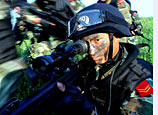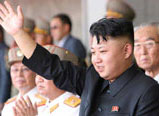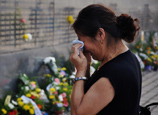
HARARE, July 28 (Xinhua) -- Zimbabwe is a few days away from national elections as concerns linger on whether the country will avoid the scenario of 2008 and hold an undisputed poll.
Violence tainted the credibility of Zimbabwe's 2008 polls. But this year, the run-up to the July 31 vote has generally been peaceful amid spirited campaigns by political leaders for nonviolence.
Both President Robert Mugabe and his rival Prime Minister Morgan Tsvangirai, the two presidential hopefuls, have been preaching peace to their supporters, riding on the slogan: "Peace begins with you, peace begins with me and peace begins with all of us."
Police chief spokesperson and Senior Assistant Commissioner Charity Charamba said the run-up to this year's polls had been largely peaceful. She said starting Saturday police officers have been dispatched to about 9,000 polling stations across the country for the elections.
Charamba told Xinhua that police have received very few cases of violence and these are mostly minor cases. "As police, we are managing," she said.
Last Friday, African Union (AU) Commission chairperson Nkosazana-Dhlamini Zuma also took note of the peaceful environment after her two-day assessment of the poll preparations on the ground.
"We appreciate the peaceful nature up to now and plead with every Zimbabwean to keep the peace right up to the end," she said.
While peace is prevailing, Tsvangirai's party and some civil society organizations are questioning the credibility of the upcoming poll, arguing that reforms in the media and security sector were not implemented to level the playing field.
McDonald Lewanika, the director of Crisis in Zimbabwe Coalition, said that although peaceful, the path to the elections has been littered with contestations between Mugabe and his political rivals that may likely lead to disputed polls.
Crisis in Zimbabwe Coalition is a broad based civil society network of over 72 members, comprising churches, women's groups, social movements, residents associations, labor unions, human rights lawyers and health professionals.
"We believe the ingredients for contestation are already there. We believe that if you want to have an election that is immune to contestation, there are certain things that you need to get right, " Lewanika said, adding that for example the election date was contested among major political camps.
Kenya's immediate former ambassador to Zimbabwe Maria Nzomo said strict adherence to the law was critical in ensuring a free and fair vote in Zimbabwe.
"The country passed a new constitution recently and its full implementation is critical to ensure there are checks and balances in the electoral process. Otherwise, a flawed election in Zimbabwe might precipitate political crisis in the country," she said.
The new constitution, among other things, stipulates that presidential election results should be announced in five days after the voting day.
Another Kenyan academic, Macharia Munene, a lecturer of international relations at U.S. International University, said political tension will be there. However, a full-blown crisis may not occur as the international community and regional nations are closely watching the situation.
An early voting arranged for police and election officials on July 14 and 15 was the latest source for concerns. The vote was marred by massive delays as printing of the ballot papers started late and proceeded slowly. As a result, 26,160 out of 65,956 voters failed to cast their ballots and were given a second chance to vote on July 31 before they go on duty.
Tsvangirai has since then openly questioned the election body's ability to hold the July 31 elections as on that date 6.2 million voters will cast their ballots at over 9,000 polling stations.
University of Zimbabwe political science lecturer, Charity Manyeruke, however, said Zimbabwe was poised to hold a credible vote on July 31.
She explained that the Zimbabwe Electoral Commission (ZEC) was conducting the special vote for the first time and "they were bound to make some mistakes" that are now being corrected.
"What is important is that the people who failed to vote were not disenfranchised as they will vote on July 31," she said.
Manyeruke said the successfully held referendum on the new constitution was ample testimony to ZEC's ability to hold smooth elections.
On claims by Tsvangirai that Zanu-PF planned to rig the vote, she dismissed these as baseless and a strategy by the party to prepare itself for defeat.
"Any political party that feels weak, inadequate and not prepared is bound to make some comments because they are afraid of losing. All indications are pointing to a certain political party winning," she said.
ZEC has assured the nation of a successful vote, promising that all election materials and other requirements would be deployed at polling stations days before polling day. It has also assured the nation of its integrity and impartiality in the wake of media reports doubting its commitment to conducting free and fair elections.
"Our commissioners and staff have been impartial in the discharge of their duties. The commission remains committed to conducting free and fair elections on July 31, 2013," it said in a statement.
















 Singer in spotlight after blog post
Singer in spotlight after blog post


![]()
